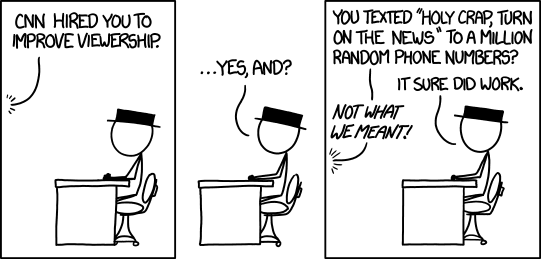Hey, Washington! The Pay Is Too Damn Low: The Minimum-Wage War
Giving America’s lowest-paid workers a raise is great for the economy. And even better for Democratic prospects in 2014
http://www.rollingstone.com/politics/news/hey-washington-the-pay-is-too-damn-low-the-minimum-wage-war-20140227
This seems to be another step in my personal liberalization. I long viewed minimum wage as a bad thing because I felt it distorted supply and demand. Those who look closely at this will note that in most cities the true minimum wage is often substantially higher than the official wage (even when the local official wage is higher than the federal wage). I felt that the federal minimum would cause distortion in rural areas where the actual value of the work a person could do was below the wage set, so either jobs didn’t get done or there developed a huge incentive for illegal immigrants.
Today, though, since I have long been on record for supporting a strong social safety net, I am now convinced (the above article was just the last straw compelling me to blog on this topic) that a robust social safety net is nothing more than a massive (and by ‘massive’ I mean $20+ billion per year; it wouldn’t shock me to find out it was 10x that amount) gift to the low wage industry (e.g., Wall-mart, McDonald’s, etc.) that goes directly to their bottom line. Why should taxpayers subsidize these very profitable industries? Shouldn’t these industries pay their employees enough so that their employees can exist without welfare?
So, now I feel that minimum wage needs to be such that someone working full-time shouldn’t have to have welfare simply to exist. While the EITC sounds like a great thing, it is also a huge gift to low-wage employers as it does exactly the same thing: subsidizes those corporations lower wages with tax dollars (the article above quotes 1/3, where I got the $20 billion figure). Man, the amount of taxpayer dollars that winds up as corporate welfare here in the US has to run to a trillion dollars, easy (think about the DoD hiring contractors because the US govt doesn’t want all those millions of people directly on the payroll; if the govt hired these people directly it would probably cost half, or even less), and this isn’t even including the trillions of dollars in direct handouts to Wall Street as reward for crashing the global economy.
You might be surprised that the GOP, long a supporter of minimal government involvement in your personal space, is fighting the idea of raising the minimum wage, tooth and nail. Shockingly (perhaps), they support the idea of increasing the EITC, more taxpayer transfers to further subsidize corporate profits. Of course, the ideal for the GOP is to remove the safety net all together, yet keep the corporate welfare going full-blast. I wonder if they realize that as the middle class shrinks the amount of tax revenue shrinks (since rich people pay a disproportionately lower share of their income as taxes), so corporate welfare increasingly becomes a larger and larger percent of the budget, but who cares about that, I guess.
I believe we need a robust social safety net so that when capitalistic excess gets out of hand (bubbles anyone?) society doesn’t have to suffer because of the bad decisions of people too rich to give a damn. If we accept a strong safety net, then we need to be absolutely sure we don’t inadvertently (as is currently the case) subsidize the profits of low-wage industries and the only way I see to do that is to have a much higher (and indexed to inflation!!!!! how could that not be the case?) minimum wage. If that drives out some labor, perhaps those jobs really aren’t that necessary to society.
